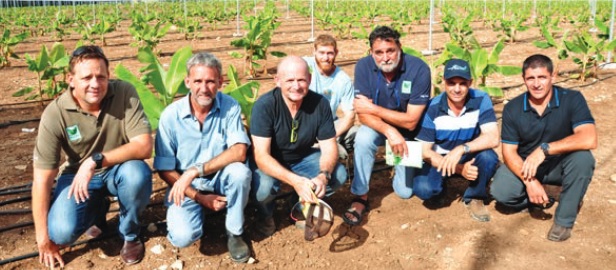
An Israeli agricultural biotechnology company is considering two Australian field trials of tissue-cultured banana plants and a collaboration on Panama-resistant varieties.
Several North Queensland growers visited the Israel operations of the company, Rahan Meristem, earlier this year. The trip was hosted by plant nutrition company Haifa Australia, which is part of a global group headquartered in Israel, and agricultural supplies company Lindsay Rural.
Rahan Meristem is already working with Filipino growers to identify TR4-resistant banana types.
It also has clonal material being screened in Holland for TR4-resistance.
The company is a leading global exporter of tissue-cultured banana and plantains with major markets are in Central America.
It has laboratories in Columbia and Ecuador, a distribution centre in Costa Rica and is planning to develop a Philippines laboratory.
Rahan Meristem Scientific Director Dr Eli Khayat told the North Queensland banana growers the company was seeking to proceed through Australian plant quarantine processes and then establish two field trials in major growing areas.
“Then we will identify a laboratory for tissue culture and propagation of material,’’ Dr Khayat said.
“I am certain that our material will be helpful to growers in Australia.’’
Rahan Meristem uses plant selection methods to identify superior clones and evaluate them for increased yield and fruit quality in tropical and subtropical climates.
Its cultivars are improvements of a range of Cavendish varieties and some of its original Williams seed was sourced from Australia.
The company’s varieties include a dwarf plant with bunch weight of up to 70 kilograms.
It also has the Adi variety, developed from Grand Nain, that it thinks may be of interest to Australian growers because it withstands strong winds and produce big bunches.
While it would be some years before the company’s varieties could become commercially available in Australia, the North Queensland growers who visited Israel were interested in the potential to access tissue-cultured technologies for the local industry.
Tully grower Stephen Lowe said Rahan Meristem’s use of somaclonal variation in its selection and breeding was impressive.
“The way they use this technique and keep selecting in the field and regenerating plants until they get what they want is very good,’’ Mr Lowe said.
Innisfail grower Shayne Cini said the company’s plant selection methods, continually taking the best 20 per cent of the population for propagation, and its tissue culture in the laboratory appeared to be ahead of similar work in Australia.
The North Queensland growers also attended agriculture exhibition Agritech in Tel Aviv and visited growers, including Israel’s largest grower and marketer, Bananot Hahof, meaning “coastal bananas’’, which has 600-hectares under production.
Martin Garate, of Swiss Farms at Lakeland Downs, said he was amazed by the efficiency in some of the growers’ operations.
“The way they select followers is very good. Hanan (Bananot Hahof farm manager Hanan Ben Shalom) is thinking four steps ahead to continue the growing cycle. He’s effectively staggering crops four ahead,’’ Martin said.
“The nutrition, particularly the way they fertigate every time they irrigate – small amounts all the time – was very impressive.
“Their use of ammonium nitrate was interesting too because we also have high pH soils.’’
He said with the exception of the cold weather, the farming conditions in Israel were similar to Swiss Farms in Lakeland.
Lindsay Rural North Queensland Regional Manager Shane O’Flanagan said the management of water, including desalinated water, across Israel was an eye-opener. The way input management had been perfected and implemented on different farms was encouraging.
“It was good for the growers to see how a tropical plant can be grown in such a marginal area. It showed that, with the right knowhow, you can really grow them anywhere if you want to,’’ Mr O’Flanagan said.
“Israeli growers understand their weather conditions, they are doing amazing things with innovation and they are not afraid to fail.’’
